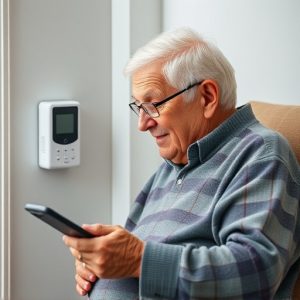Safety and Security: Personal Alarms for Elderly Fall Prevention
Personal alarm systems for the elderly have been significantly enhanced with technology that includ…….
Personal alarm systems for the elderly have been significantly enhanced with technology that includes fall detection, providing a critical safety net by automatically alerting caregivers or emergency services after a fall. These devices use motion sensors and algorithms to accurately distinguish between a fall and normal movement, offering a quick response that reduces rescue delays. They are designed to be lightweight, intuitive, and adaptable for various living environments, which is crucial for seniors who value independence while ensuring their safety. The systems offer round-the-clock monitoring services and have become indispensable tools for the elderly, enabling them to maintain autonomy with the knowledge that immediate help is available should they fall or require assistance. When selecting a personal alarm system for elderly care, it's important to consider factors such as reliability, ease of use, durability, battery life, operational range, and the type of emergency response provided, ensuring the system aligns with the individual's specific needs and living situation. These considerations ensure that the chosen device will enhance safety, independence, and peace of mind for older adults living at home. This guide provides essential information to help you navigate the options and select a personal alarm tailored to elderly care, emphasizing security and reliability.
every year, millions of individuals aged 65 and older face the risk of falling. These incidents can lead to serious injuries and hinder independence. A personal alarm for the elderly designed to detect falls offers a vital safety net, ensuring timely assistance. This article delves into the essentials of fall detection alarms, outlining their features, benefits, and how to select the ideal system for elderly care. Understanding the technology behind these devices is crucial for those looking to safeguard their loved ones’ well-being.
Understanding Fall Detection Alarms: A Safety Net for the Elderly
Fall detection alarms represent a significant advancement in home safety systems, particularly for the elderly. These innovative devices are designed to automatically detect a fall and alert caregivers or emergency services if the individual is unable to respond. The technology behind these personal alarm systems involves a combination of motion sensors and advanced algorithms that can differentiate between a fall and regular movement or activity. When a fall is detected, the system sends an immediate notification to pre-set contacts, ensuring prompt assistance and reducing response time significantly. This feature provides an unparalleled sense of security for seniors who live alone, allowing them to maintain independence while knowing that help is just a signal away in case of an unexpected fall.
The integration of fall detection alarms into the daily lives of the elderly has been transformative. These devices are not merely passive safety tools; they are active guardians that monitor for potential risks around the clock. The reliability and accuracy of these systems have been substantially improved over time, with modern personal alarm for elderly individuals now being lightweight, user-friendly, and capable of functioning across various environments. This makes them a practical choice for seniors who value both their autonomy and safety. The deployment of fall detection alarms has thus become a cornerstone in promoting elderly well-being and enhancing the overall quality of life for those who wish to age in place with dignity and security.
Features and Benefits of Personal Alarm Systems for Seniors
Personal alarm systems for seniors are designed with a suite of features that prioritize safety, autonomy, and peace of mind for both the elderly users and their loved ones. These systems typically come with wearable devices such as wristbands or pendants that can be activated at the touch of a button in the event of a fall or when assistance is needed. The immediacy of this response mechanism is crucial, as falls are a leading cause of injury among older adults, often resulting from sudden health deteriorations, mobility issues, or hazards within the home environment.
The benefits of these personal alarm systems are manifold. They offer 24/7 monitoring, ensuring that help can be dispatched quickly to the senior’s location, minimizing potential harm and facilitating timely medical intervention if necessary. The systems also support a senior’s independence by allowing them to live in their own homes with confidence, knowing that help is just a signal away. Additionally, these alarms provide caregivers and family members with reassurance that their loved ones are protected. Advanced models may also feature fall detection technology specifically designed for the elderly, which automatically triggers an alarm if a fall is detected, even if the user is unable to press the button due to incapacitation. This added safety feature underscores the importance of personal alarm systems as a vital component in safeguarding the well-being of seniors in their homes.
Choosing the Right Personal Alarm for Elderly Care: Factors to Consider
When selecting a personal alarm system tailored for elderly care, it’s crucial to consider several factors to ensure the device meets the unique needs and circumstances of older adults. Firstly, the reliability of the alarm in terms of its response time and connectivity is paramount. The system should be able to detect falls accurately and transmit alerts promptly to a monitoring center or designated caregiver. Additionally, the device must be user-friendly; it should be easy to operate and wear, with intuitive features that accommodate potential cognitive impairments or visual limitations.
Another key factor is the alarm’s portability and durability. It should be compact enough to be carried effortlessly yet robust to withstand everyday use without malfunctioning. Moreover, consider the device’s battery life; it must have a long-lasting charge or an easy-to-replace battery to ensure continuous protection. The range of operation is also important, as it determines whether the elderly individual can move around their home or immediate surroundings without losing the alarm’s coverage. Finally, assess the type of assistance the alarm can call for upon activation; some systems are designed to alert a neighbor, family member, or professional care service, depending on the user’s preferences and the level of care required. By carefully evaluating these factors, you can choose a personal alarm for elderly care that offers peace of mind, independence, and safety.


